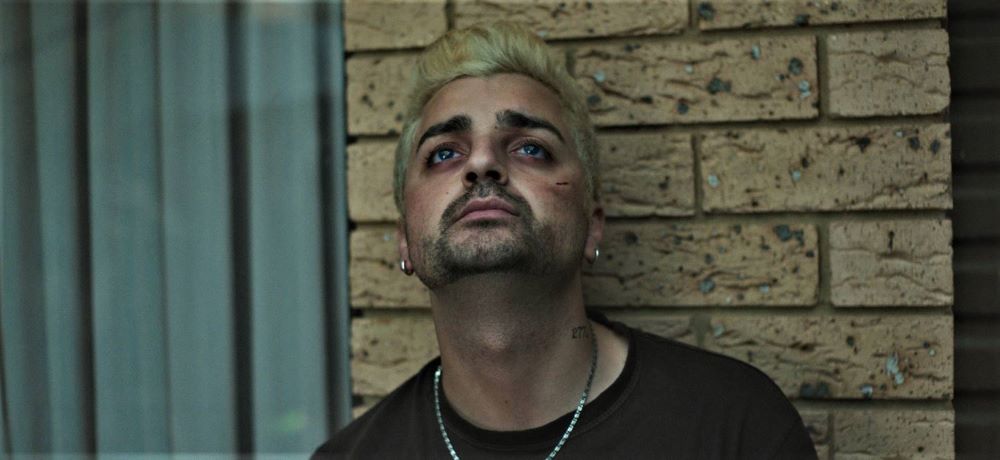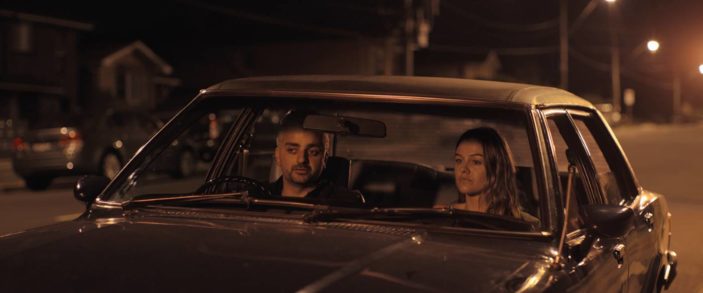
The impact of drugs, violence and racism has always gripped the hearts and minds of audiences the world over. It’s quite a refreshing coat of paint to see that in your own Aussie backyard helmed by a writer-director with unquestionable lived experience in the matter: Ronnie S Riskalla. Yet after I left the Orpheum world premiere, one quote from the film editing master Walter Murch kept gnawing at my mind – “Every film is a puzzle really, from an editorial point of view.”
Streets of Colour is as much a courageous Australian tale of identity and tragedy, as it is a harsh reminder about the difficulties of filmmaking and working your story from script to the editing room. Drawing from the director’s own difficult upbringing in Western Sydney, the raw personal vigour of this film transcends the screen and captivates from the beginning.
Set and shot in Western Sydney’s Mount Druitt, the story follows 25-year-old Tez (played fiercely by Rahel Romahn) who becomes a drug dealer after struggling to deal with personal tragedy stirred upon by his crime-infested suburb’s systemic racism and bigotry. It takes viewers on a poignant and enlightening journey through crime underworlds, personal demons, and the quest for love.
There are commendable nuggets of Australian cinema here that may not be seen again soon. A (mostly) commanding style consistency is had in Zachary Peel McGregor and Antoine Mikeo’s cinematography that showcases a down-and-dirty ragtag neighbourhood with visceral matchings between focal points and character interaction. Shots identify the boots-on-the-ground feel of suburban streets filled with strife and discord.

The supporting characters of rival gangs, bikies and any hoodlum relevance almost steal the show in their rough, tough but effortless hilarious dry Aussie wit and persona. Characters like Bikie Uncle Mick played by Anthony Thomas, and witty henchman Kresna played by Tommy Ropati, add a spice of fun and stakes making this Mt Druitt a real breathed-in crime infested world of iconic personality clashes.
While the film showcases authentic Aussie world-building and entertaining characters, it suffers from disjointed editing choices that disrupt the emotional flow and pacing. Certain scenes drag on for too long while other scenes have such a tenacity to keep cutting to different coverages repeatedly within the conversation that it feels more distracting than any reasonable sense of artistic purpose. There were a number of credited editors as well as the director himself, which may speak to a case of too many cooks in the kitchen. However, the montage sequences of characters taking their illicit substances have a tactility in its mix of sound design, cutting and shots, that does not hold any punches in immersing you in the experience.
The score does a commendable job of wrestling a lot of emotionally rich scenes often back to back. However, its use of certain piano keys in pedal can often come across as a tad repetitive in the movie’s latter half with little leitmotif development or variation to keep things fresh. It also has an uncanny tendency to prematurely cue itself within the scene that signals to the audience what emotion they’re supposed to be feeling before the scene’s dialogue or actions can do that for itself. Scoring dialogue is not easy but one wonders if the adage of less is more can be applied here in either the omission of certain cues or the use of hard-hitting chords that does not clash with the dialogue.
Religious allegory plays a significant role in the film, particularly in its final chapters. As someone leaning toward agnosticism, I appreciate religion in storytelling, but the way it is included here takes reigns on Tez’s agency that may leave some people feeling like it’s more ham-fisted or in Deus ex machina territory rather than a gradual and earned hero’s journey.
With numerous characters and themes, Streets of Colour might have been better suited as a TV series. Some side characters feel underdeveloped, making their transformations hollow and reducing them to plot devices. While characters being plot devices isn’t inherently wrong, their struggles and backstories, showcased in incredible performances (by the likes of Elliot Giarola, Dina Gillespie, Deng Deng, Athiel and Peter McAllum) could have been explored further.
Streets of Colour is an ambitious and personal tale, exploring many characters, themes, and allegories, aiming to spark conversation. It earns its place with a powerful story that tugs at the audience’s heartstrings and brings an authentic world to life under Riskalla’s direction. However, it struggles under the weight of its ambitions, despite some true moments of brilliance for modern Australian cinema. A truly rough and flawed gem that could’ve done more marination before being put out on to the grill.
TWO AND A HALF STARS (OUT OF FIVE)
Streets of Colour will be screening in select Sydney venues including Casula Powerhouse on July 22nd, Actors Centre, Leichardt on Monday 31st and Paramatta Riverside August 24-25th as well as September 2nd. For other states, this includes Village Cinemas in Launceston on August 6th, The Backlot in Perth on August 13th, and New Farm Cinemas for Brisbane on August 16th.
